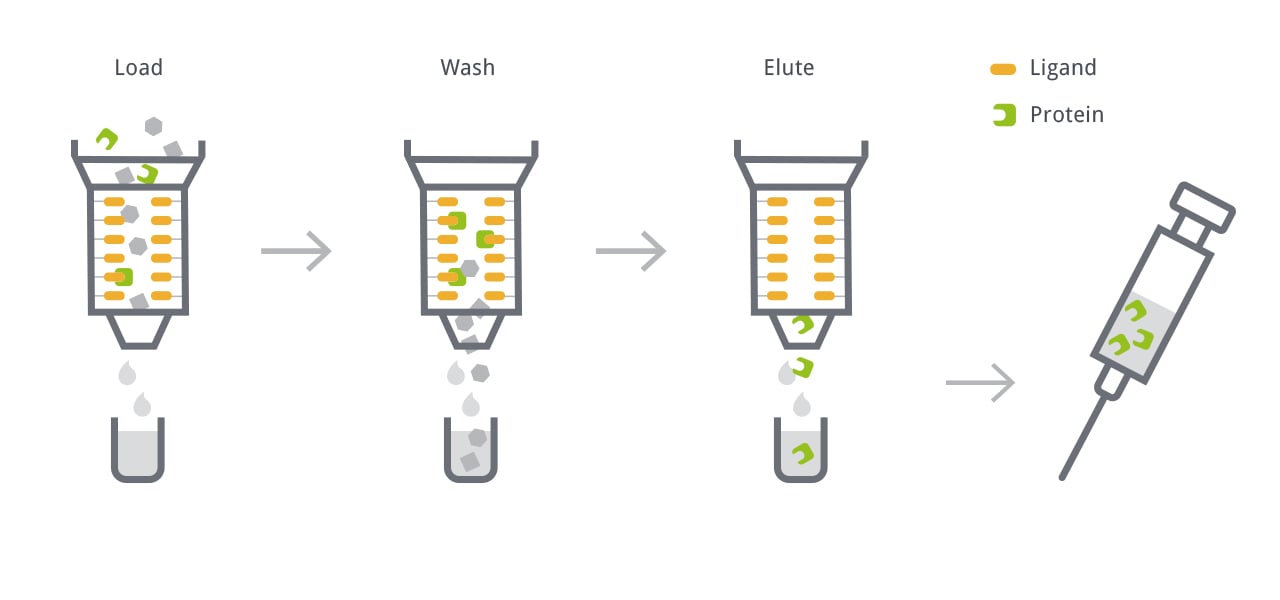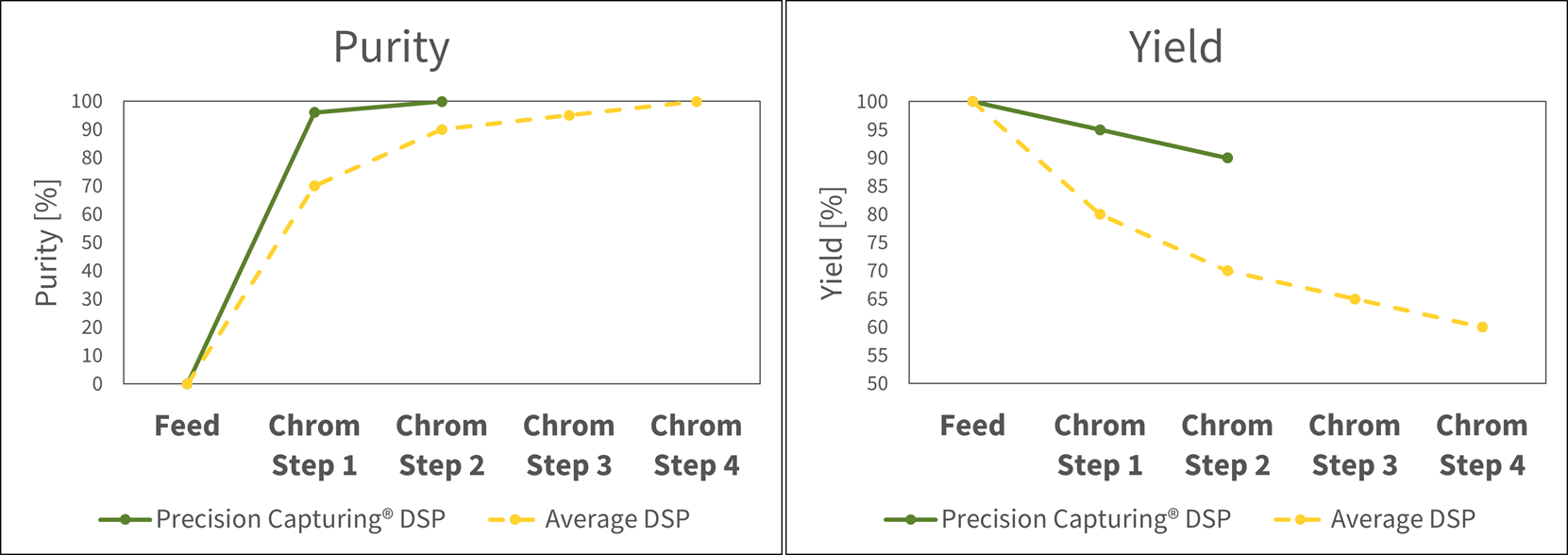Affinity Chromatography for Recombinant Protein Purification
August 1, 2022 / Author: Navigo Proteins

Scientists continuously face pressure to purify biologics with maximum yield while minimizing cost and developing processes as quickly as possible. Downstream processing (DSP) often accounts for more than half the cost of goods overall and significantly impacts manufacturing timelines.
Affinity Chromatography for recombinant protein purification manages to achieve high purity and yield as well as enabling a simplified process architecture. This robust and scalable process de-risks asset development and enables recombinant protein purification where less efficient purification steps might fail.
The Precision Capturing® technology is the basis of the development of custom affinity chromatography for recombinant protein purification.
Innovative Recombinant Protein Purification
Therapeutic proteins are becoming more and more successful with over 130 FDA approved and over 170 used in medicine worldwide. They are produced from various expression systems, including bacteria, fungi, insect, plant, and mammalian cells. For pre-clinical, clinical, and commercial development and therapeutic use, these proteins need to be purified to homogeneity in individually custom-tailored DSPs for each protein anew, depending on their physicochemical properties.
While a range of different affinity tags are available and commonly used in R&D stages, therapeutic proteins from pre-clinical stage onwards are usually purified in their native, non-tagged forms. This requires the development of multi-step chromatography procedures with their respective product losses.
Antibodies have set the gold-standard when it comes to a high-performing DSP platform thanks to Protein A affinity chromatography. Through engineering of an artificial Protein A, these advantages can now be brought into the field of non-antibody purification.
These new affinity ligands interact with the protein of interest through rigid body interactions based on their respective 3D structures. Proteins of interest can vary widely in structure so during the selection process, different libraries with a variation of 1012 each are screened for a fitting affinity ligand.
Affinity Solutions to DSP Challenges
The balance between purity and yield
Purity is the prerequisite for a successful DSP development. Without the required purity, a therapeutic protein cannot safely be given to patients. In the effort to get as close to 100% purity as possible, a bit of target protein gets lost in each purification step. The more steps necessary, the more gets lost and in the end the process may not be economically viable because yield is simply too low. Here, affinity chromatography for recombinant protein purification can enable an economic purification process.
High performance, custom affinity chromatography for recombinant protein purification reaches over 95% purity in a single capture step. Due to this, an affinity-based process is shorter than a conventional DSP for protein purification. Yield remains high as less product is lost in a multi-chromatography step process. The figures above exemplify this principle by showing an average protein DSP using four chromatography steps to reach the required purity versus an affinity-based approach which reaches the required levels after only two chromatography steps.
You can find out more about the Precision Capturing® affinity resin performance in our Whitepaper:
Removing Critical and Product-related Impurities
Critical impurities or product-related impurities can also be a challenge to remove from the purification train. Affinity offers more than one solution for the elimination of these impurities. Product-related impurities in particular can be difficult to remove as they may present similar characteristics as the protein of interest. Efficient removal of these impurities can be achieved by careful selection of the respective ligand candidate against a binding epitope that only exists on the desired isoform of the protein, thus disregarding the undesired form. Is the impurity in question not product-related, it can also be targeted with an alternative purification strategy. In a flow-through approach, the affinity ligand selected captures the impurity instead of the protein of interest. If the impurity is expression system based this can also enable a platform use of the resin for various products based on the expression system at hand. An exclusive Precision Capturing® resin that takes this approach targets glycoprotein 64 from the baculovirus expression system.
Mild Elution Conditions for pH-sensitive Proteins
The capture of a desired protein is just the first part of an affinity chromatography step. After the protein is bound to the column, it needs to be released once the wash steps are completed. Traditionally, Protein A uses pH to steer binding interactions and elution is achieved through lowering the pH to 3.5. This works fine for monoclonal antibodies, however, therapeutic proteins may not be stable at such a low pH. Again, ligand engineering is the key. The scaffold variations in the Precision Capturing® libraries possess varying pH elution profiles from the traditional 3.5 all the way up to neutral pH ranges.
Affinity Resin Development
Affinity resins are scalable to fit needs for commercial supply and Navigo® works with manufacturing partners to secure large-scale GMP-compliant resin manufacturing for our clients.
Ligand discovery and resin development including the production of small-scale resin quantitites and delivery to the client takes as little as 4 months. Beyond that, resin scale-up and validation by a large-scale manufacturing partner takes around 5 additional months. An intermittent supply of research-grade resin in liter scale is possible.
Precision Capturing® affinity resins can use conventional Protein A leaching kits to assure column safety and are currently part of large-scale non-mAb protein manufacturing with FDA and EMA approval.
Precision Capturing® can add value to early-stage assets, as well as products in different lifecycle management phases. The affinity development project can also be done in parallel to other, upstream, process development activities.
An end-to-end solution for custom affinity chromatography resins
Precision Capturing® is a unique and innovative affinity technology to platformize the downstream process development for recombinant proteins to a robust, predictable, scalable, and rapid, GMP-compliant purification procedure, achieving over 95% purity and yield in a single chromatography step.
Precision Capturing® custom affinity chromatography for recombinant protein purification is based on a proprietary artificial Protein A scaffold. It combines the industry-accepted virtues of Protein A with entirely new target specificities and mild elution conditions.
By reducing DSP development timelines and risks, Precision Capturing® adds early value to manufacturing processes of otherwise tedious-to-purify recombinant proteins. With its strategic manufacturing partners, such as Repligen Corporation, Navigo® offers end-to-end custom affinity chromatography solutions from ligand discovery to large-scale resin supply for commercial biologics manufacturing.



